MPA802 Taxation Law Report: Dividend Imputation Reform Analysis
VerifiedAdded on 2022/12/27
|14
|3555
|21
Report
AI Summary
This report examines the Australian Labor Party's (ALP) proposed reform to the dividend imputation credit system within the context of Australian taxation law. The report analyzes the significance of the policy, aiming to eliminate double taxation on company dividends, and its implications for various stakeholders, including governments, individuals, and investors. The key stakeholders impacted by the policy are governments, individuals, and investors. The report also evaluates the comprehensiveness of the proposal, the potential impact on wealthy retirees, and the broader effects on the Australian economy and investment landscape. The report further delves into the specific changes proposed, such as removing cash refunds for excess dividend imputation credits, and discusses the potential consequences for investors, particularly those in self-managed super funds (SMSFs). Finally, it assesses the proposal's strengths, weaknesses, and potential effects on the overall tax system. The report concludes with an overview of the policy's impact and potential implications on the financial stability of the country.
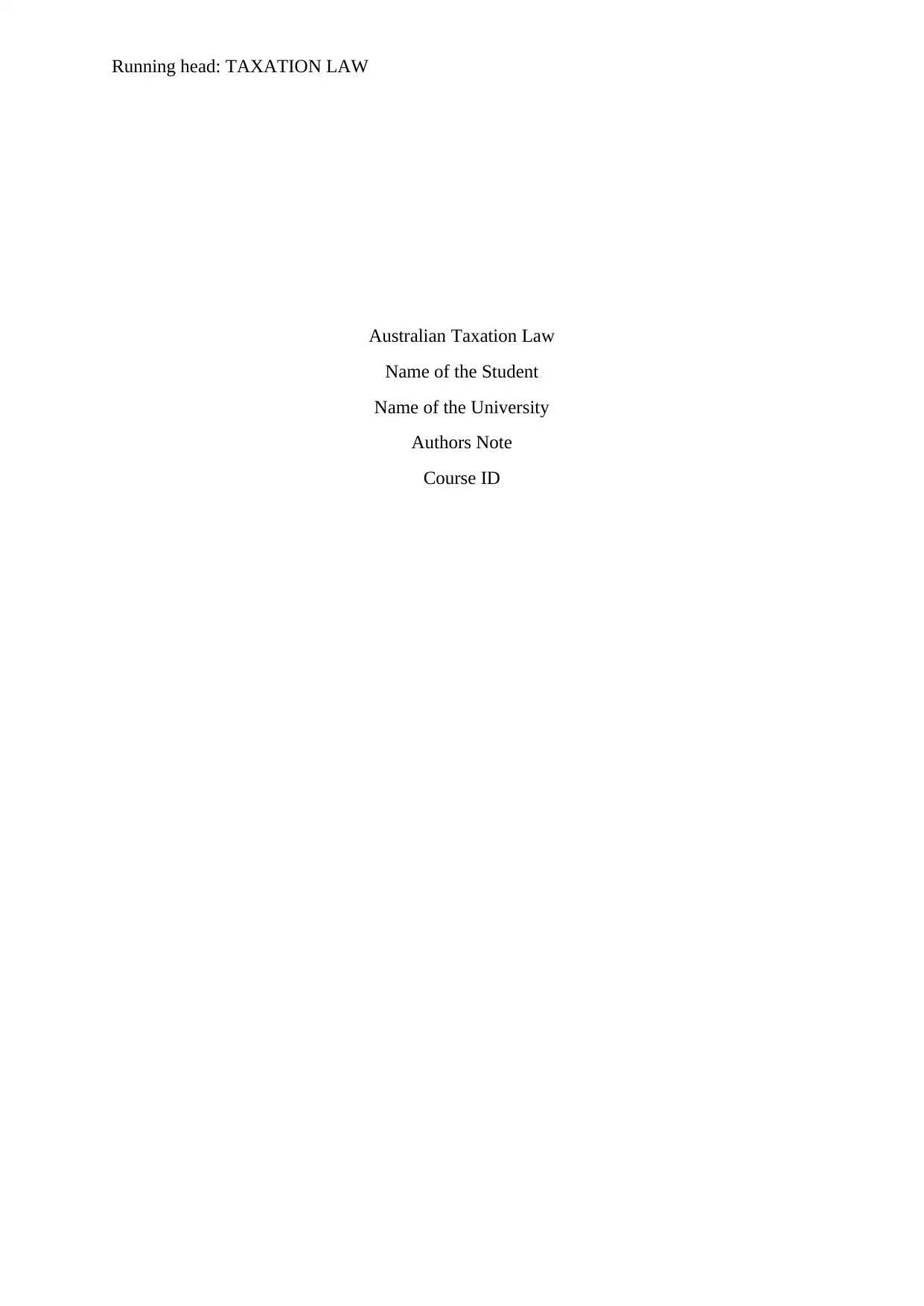
Running head: TAXATION LAW
Australian Taxation Law
Name of the Student
Name of the University
Authors Note
Course ID
Australian Taxation Law
Name of the Student
Name of the University
Authors Note
Course ID
Paraphrase This Document
Need a fresh take? Get an instant paraphrase of this document with our AI Paraphraser
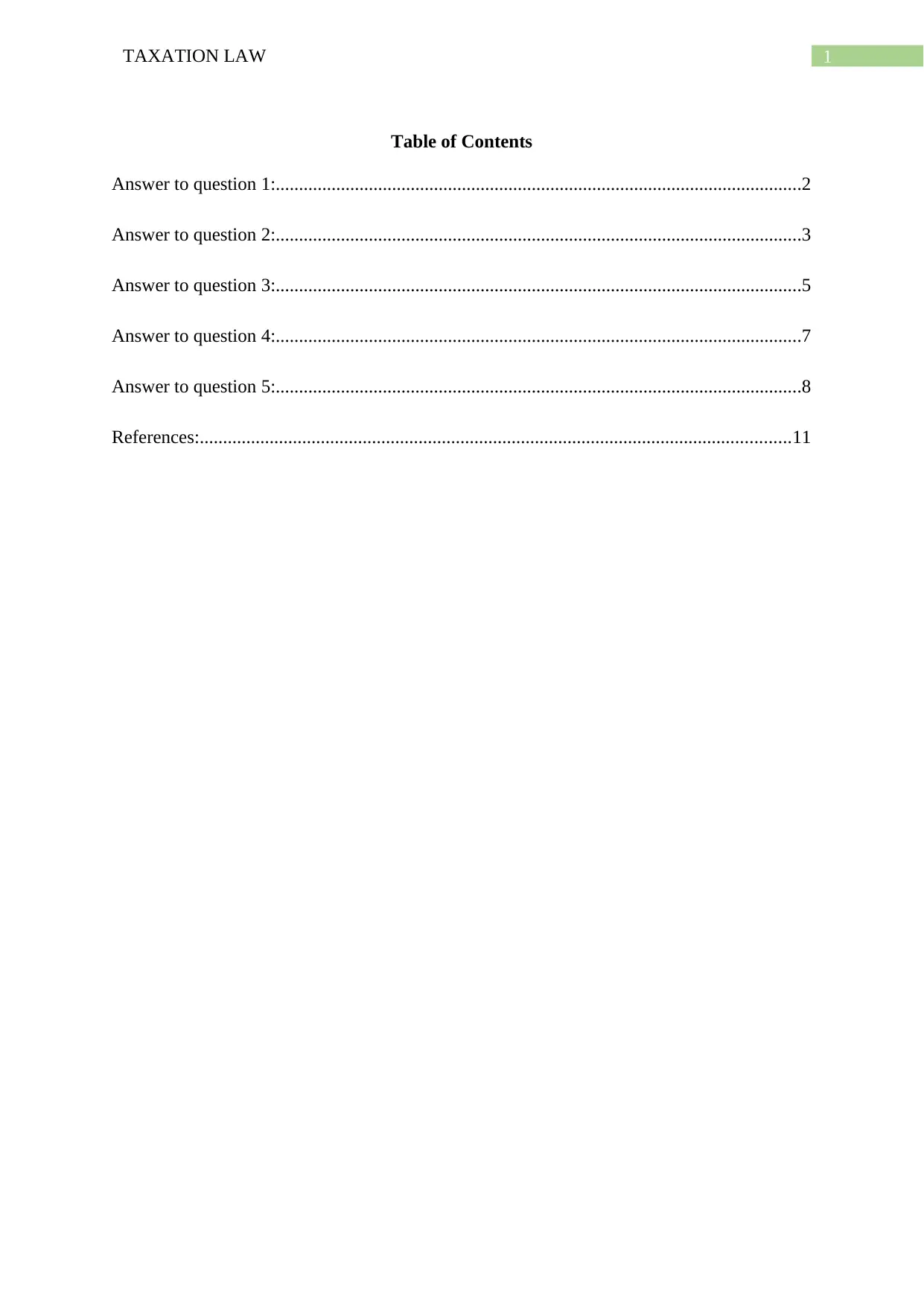
1TAXATION LAW
Table of Contents
Answer to question 1:.................................................................................................................2
Answer to question 2:.................................................................................................................3
Answer to question 3:.................................................................................................................5
Answer to question 4:.................................................................................................................7
Answer to question 5:.................................................................................................................8
References:...............................................................................................................................11
Table of Contents
Answer to question 1:.................................................................................................................2
Answer to question 2:.................................................................................................................3
Answer to question 3:.................................................................................................................5
Answer to question 4:.................................................................................................................7
Answer to question 5:.................................................................................................................8
References:...............................................................................................................................11
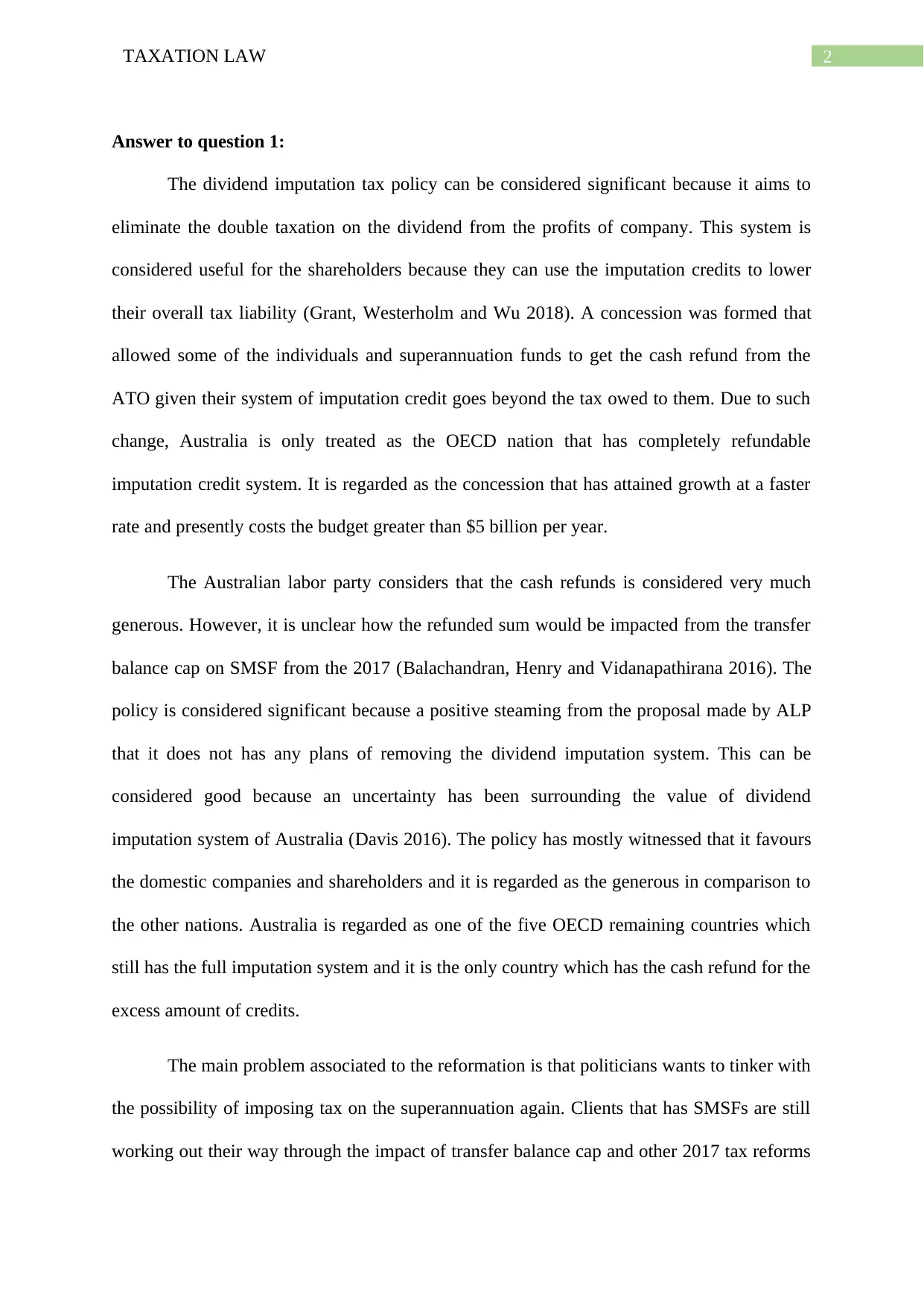
2TAXATION LAW
Answer to question 1:
The dividend imputation tax policy can be considered significant because it aims to
eliminate the double taxation on the dividend from the profits of company. This system is
considered useful for the shareholders because they can use the imputation credits to lower
their overall tax liability (Grant, Westerholm and Wu 2018). A concession was formed that
allowed some of the individuals and superannuation funds to get the cash refund from the
ATO given their system of imputation credit goes beyond the tax owed to them. Due to such
change, Australia is only treated as the OECD nation that has completely refundable
imputation credit system. It is regarded as the concession that has attained growth at a faster
rate and presently costs the budget greater than $5 billion per year.
The Australian labor party considers that the cash refunds is considered very much
generous. However, it is unclear how the refunded sum would be impacted from the transfer
balance cap on SMSF from the 2017 (Balachandran, Henry and Vidanapathirana 2016). The
policy is considered significant because a positive steaming from the proposal made by ALP
that it does not has any plans of removing the dividend imputation system. This can be
considered good because an uncertainty has been surrounding the value of dividend
imputation system of Australia (Davis 2016). The policy has mostly witnessed that it favours
the domestic companies and shareholders and it is regarded as the generous in comparison to
the other nations. Australia is regarded as one of the five OECD remaining countries which
still has the full imputation system and it is the only country which has the cash refund for the
excess amount of credits.
The main problem associated to the reformation is that politicians wants to tinker with
the possibility of imposing tax on the superannuation again. Clients that has SMSFs are still
working out their way through the impact of transfer balance cap and other 2017 tax reforms
Answer to question 1:
The dividend imputation tax policy can be considered significant because it aims to
eliminate the double taxation on the dividend from the profits of company. This system is
considered useful for the shareholders because they can use the imputation credits to lower
their overall tax liability (Grant, Westerholm and Wu 2018). A concession was formed that
allowed some of the individuals and superannuation funds to get the cash refund from the
ATO given their system of imputation credit goes beyond the tax owed to them. Due to such
change, Australia is only treated as the OECD nation that has completely refundable
imputation credit system. It is regarded as the concession that has attained growth at a faster
rate and presently costs the budget greater than $5 billion per year.
The Australian labor party considers that the cash refunds is considered very much
generous. However, it is unclear how the refunded sum would be impacted from the transfer
balance cap on SMSF from the 2017 (Balachandran, Henry and Vidanapathirana 2016). The
policy is considered significant because a positive steaming from the proposal made by ALP
that it does not has any plans of removing the dividend imputation system. This can be
considered good because an uncertainty has been surrounding the value of dividend
imputation system of Australia (Davis 2016). The policy has mostly witnessed that it favours
the domestic companies and shareholders and it is regarded as the generous in comparison to
the other nations. Australia is regarded as one of the five OECD remaining countries which
still has the full imputation system and it is the only country which has the cash refund for the
excess amount of credits.
The main problem associated to the reformation is that politicians wants to tinker with
the possibility of imposing tax on the superannuation again. Clients that has SMSFs are still
working out their way through the impact of transfer balance cap and other 2017 tax reforms
⊘ This is a preview!⊘
Do you want full access?
Subscribe today to unlock all pages.

Trusted by 1+ million students worldwide
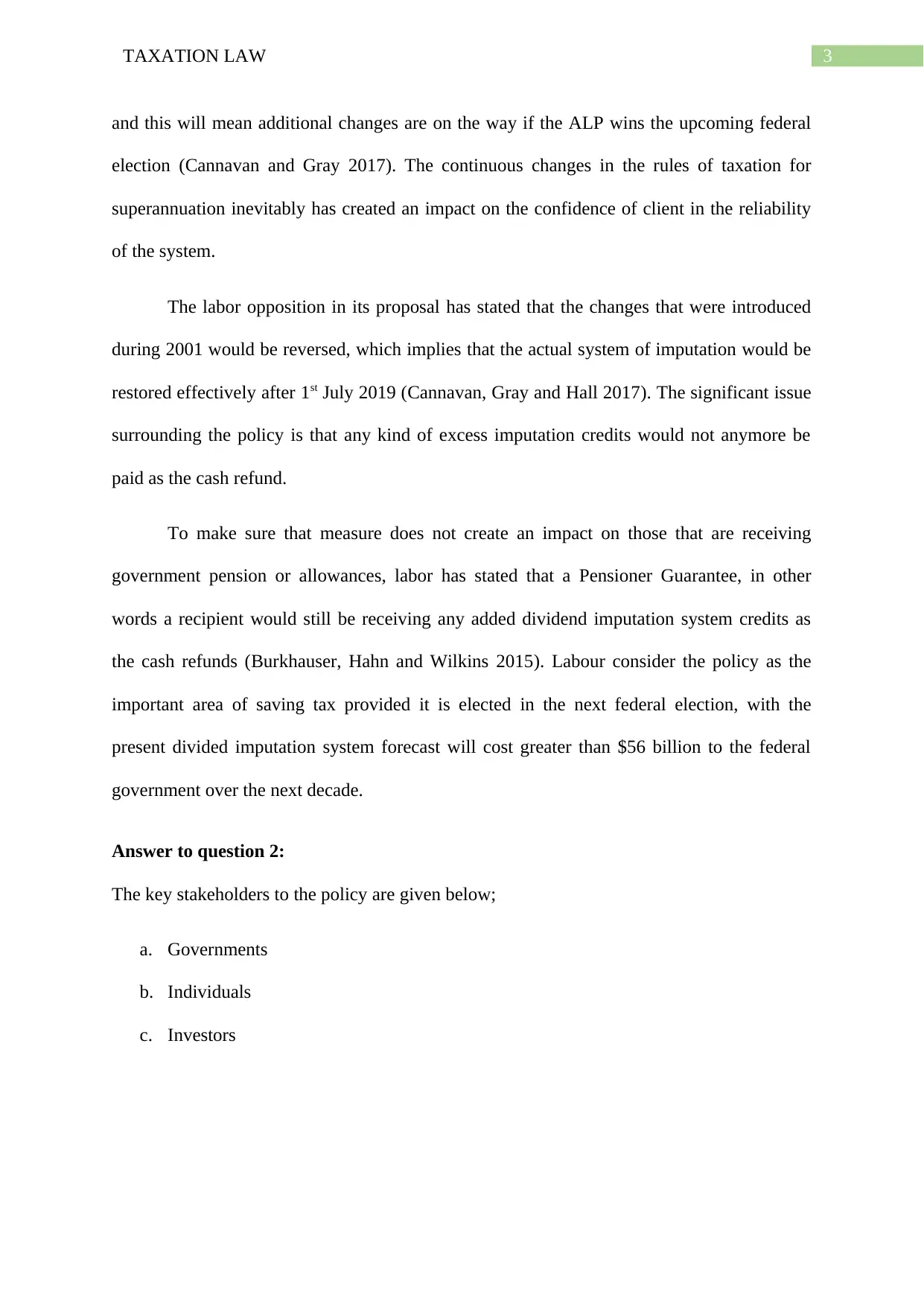
3TAXATION LAW
and this will mean additional changes are on the way if the ALP wins the upcoming federal
election (Cannavan and Gray 2017). The continuous changes in the rules of taxation for
superannuation inevitably has created an impact on the confidence of client in the reliability
of the system.
The labor opposition in its proposal has stated that the changes that were introduced
during 2001 would be reversed, which implies that the actual system of imputation would be
restored effectively after 1st July 2019 (Cannavan, Gray and Hall 2017). The significant issue
surrounding the policy is that any kind of excess imputation credits would not anymore be
paid as the cash refund.
To make sure that measure does not create an impact on those that are receiving
government pension or allowances, labor has stated that a Pensioner Guarantee, in other
words a recipient would still be receiving any added dividend imputation system credits as
the cash refunds (Burkhauser, Hahn and Wilkins 2015). Labour consider the policy as the
important area of saving tax provided it is elected in the next federal election, with the
present divided imputation system forecast will cost greater than $56 billion to the federal
government over the next decade.
Answer to question 2:
The key stakeholders to the policy are given below;
a. Governments
b. Individuals
c. Investors
and this will mean additional changes are on the way if the ALP wins the upcoming federal
election (Cannavan and Gray 2017). The continuous changes in the rules of taxation for
superannuation inevitably has created an impact on the confidence of client in the reliability
of the system.
The labor opposition in its proposal has stated that the changes that were introduced
during 2001 would be reversed, which implies that the actual system of imputation would be
restored effectively after 1st July 2019 (Cannavan, Gray and Hall 2017). The significant issue
surrounding the policy is that any kind of excess imputation credits would not anymore be
paid as the cash refund.
To make sure that measure does not create an impact on those that are receiving
government pension or allowances, labor has stated that a Pensioner Guarantee, in other
words a recipient would still be receiving any added dividend imputation system credits as
the cash refunds (Burkhauser, Hahn and Wilkins 2015). Labour consider the policy as the
important area of saving tax provided it is elected in the next federal election, with the
present divided imputation system forecast will cost greater than $56 billion to the federal
government over the next decade.
Answer to question 2:
The key stakeholders to the policy are given below;
a. Governments
b. Individuals
c. Investors
Paraphrase This Document
Need a fresh take? Get an instant paraphrase of this document with our AI Paraphraser
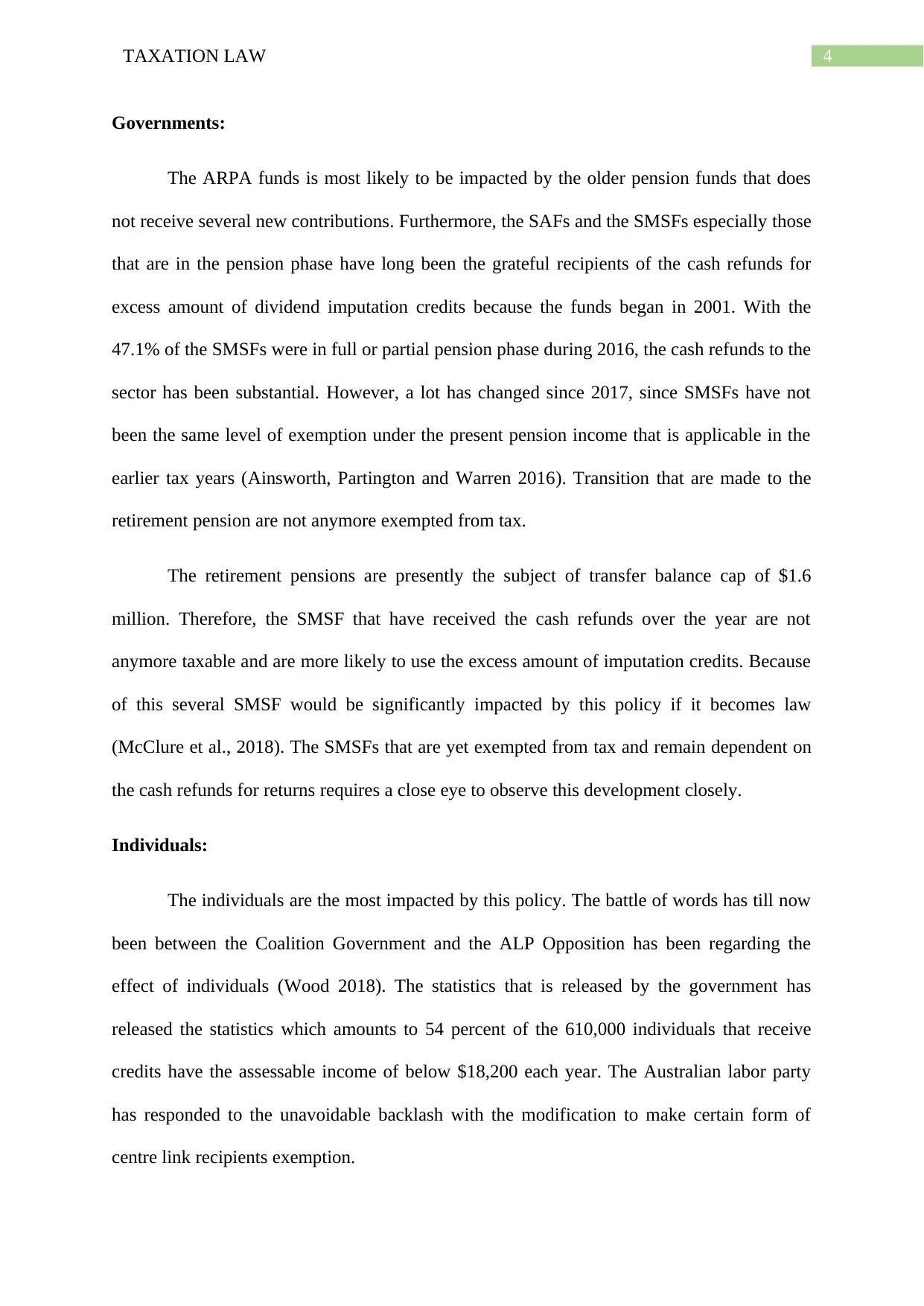
4TAXATION LAW
Governments:
The ARPA funds is most likely to be impacted by the older pension funds that does
not receive several new contributions. Furthermore, the SAFs and the SMSFs especially those
that are in the pension phase have long been the grateful recipients of the cash refunds for
excess amount of dividend imputation credits because the funds began in 2001. With the
47.1% of the SMSFs were in full or partial pension phase during 2016, the cash refunds to the
sector has been substantial. However, a lot has changed since 2017, since SMSFs have not
been the same level of exemption under the present pension income that is applicable in the
earlier tax years (Ainsworth, Partington and Warren 2016). Transition that are made to the
retirement pension are not anymore exempted from tax.
The retirement pensions are presently the subject of transfer balance cap of $1.6
million. Therefore, the SMSF that have received the cash refunds over the year are not
anymore taxable and are more likely to use the excess amount of imputation credits. Because
of this several SMSF would be significantly impacted by this policy if it becomes law
(McClure et al., 2018). The SMSFs that are yet exempted from tax and remain dependent on
the cash refunds for returns requires a close eye to observe this development closely.
Individuals:
The individuals are the most impacted by this policy. The battle of words has till now
been between the Coalition Government and the ALP Opposition has been regarding the
effect of individuals (Wood 2018). The statistics that is released by the government has
released the statistics which amounts to 54 percent of the 610,000 individuals that receive
credits have the assessable income of below $18,200 each year. The Australian labor party
has responded to the unavoidable backlash with the modification to make certain form of
centre link recipients exemption.
Governments:
The ARPA funds is most likely to be impacted by the older pension funds that does
not receive several new contributions. Furthermore, the SAFs and the SMSFs especially those
that are in the pension phase have long been the grateful recipients of the cash refunds for
excess amount of dividend imputation credits because the funds began in 2001. With the
47.1% of the SMSFs were in full or partial pension phase during 2016, the cash refunds to the
sector has been substantial. However, a lot has changed since 2017, since SMSFs have not
been the same level of exemption under the present pension income that is applicable in the
earlier tax years (Ainsworth, Partington and Warren 2016). Transition that are made to the
retirement pension are not anymore exempted from tax.
The retirement pensions are presently the subject of transfer balance cap of $1.6
million. Therefore, the SMSF that have received the cash refunds over the year are not
anymore taxable and are more likely to use the excess amount of imputation credits. Because
of this several SMSF would be significantly impacted by this policy if it becomes law
(McClure et al., 2018). The SMSFs that are yet exempted from tax and remain dependent on
the cash refunds for returns requires a close eye to observe this development closely.
Individuals:
The individuals are the most impacted by this policy. The battle of words has till now
been between the Coalition Government and the ALP Opposition has been regarding the
effect of individuals (Wood 2018). The statistics that is released by the government has
released the statistics which amounts to 54 percent of the 610,000 individuals that receive
credits have the assessable income of below $18,200 each year. The Australian labor party
has responded to the unavoidable backlash with the modification to make certain form of
centre link recipients exemption.
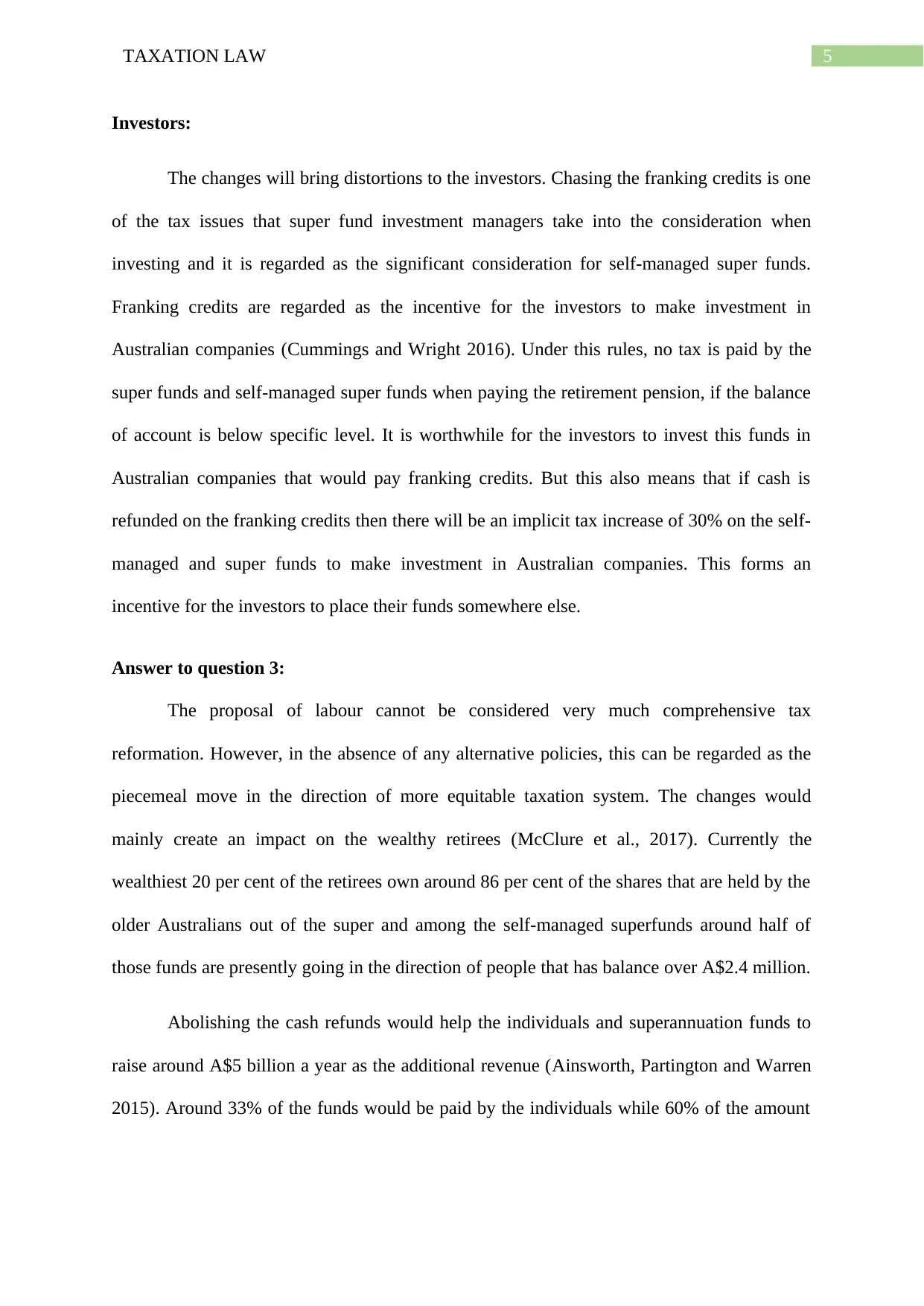
5TAXATION LAW
Investors:
The changes will bring distortions to the investors. Chasing the franking credits is one
of the tax issues that super fund investment managers take into the consideration when
investing and it is regarded as the significant consideration for self-managed super funds.
Franking credits are regarded as the incentive for the investors to make investment in
Australian companies (Cummings and Wright 2016). Under this rules, no tax is paid by the
super funds and self-managed super funds when paying the retirement pension, if the balance
of account is below specific level. It is worthwhile for the investors to invest this funds in
Australian companies that would pay franking credits. But this also means that if cash is
refunded on the franking credits then there will be an implicit tax increase of 30% on the self-
managed and super funds to make investment in Australian companies. This forms an
incentive for the investors to place their funds somewhere else.
Answer to question 3:
The proposal of labour cannot be considered very much comprehensive tax
reformation. However, in the absence of any alternative policies, this can be regarded as the
piecemeal move in the direction of more equitable taxation system. The changes would
mainly create an impact on the wealthy retirees (McClure et al., 2017). Currently the
wealthiest 20 per cent of the retirees own around 86 per cent of the shares that are held by the
older Australians out of the super and among the self-managed superfunds around half of
those funds are presently going in the direction of people that has balance over A$2.4 million.
Abolishing the cash refunds would help the individuals and superannuation funds to
raise around A$5 billion a year as the additional revenue (Ainsworth, Partington and Warren
2015). Around 33% of the funds would be paid by the individuals while 60% of the amount
Investors:
The changes will bring distortions to the investors. Chasing the franking credits is one
of the tax issues that super fund investment managers take into the consideration when
investing and it is regarded as the significant consideration for self-managed super funds.
Franking credits are regarded as the incentive for the investors to make investment in
Australian companies (Cummings and Wright 2016). Under this rules, no tax is paid by the
super funds and self-managed super funds when paying the retirement pension, if the balance
of account is below specific level. It is worthwhile for the investors to invest this funds in
Australian companies that would pay franking credits. But this also means that if cash is
refunded on the franking credits then there will be an implicit tax increase of 30% on the self-
managed and super funds to make investment in Australian companies. This forms an
incentive for the investors to place their funds somewhere else.
Answer to question 3:
The proposal of labour cannot be considered very much comprehensive tax
reformation. However, in the absence of any alternative policies, this can be regarded as the
piecemeal move in the direction of more equitable taxation system. The changes would
mainly create an impact on the wealthy retirees (McClure et al., 2017). Currently the
wealthiest 20 per cent of the retirees own around 86 per cent of the shares that are held by the
older Australians out of the super and among the self-managed superfunds around half of
those funds are presently going in the direction of people that has balance over A$2.4 million.
Abolishing the cash refunds would help the individuals and superannuation funds to
raise around A$5 billion a year as the additional revenue (Ainsworth, Partington and Warren
2015). Around 33% of the funds would be paid by the individuals while 60% of the amount
⊘ This is a preview!⊘
Do you want full access?
Subscribe today to unlock all pages.

Trusted by 1+ million students worldwide
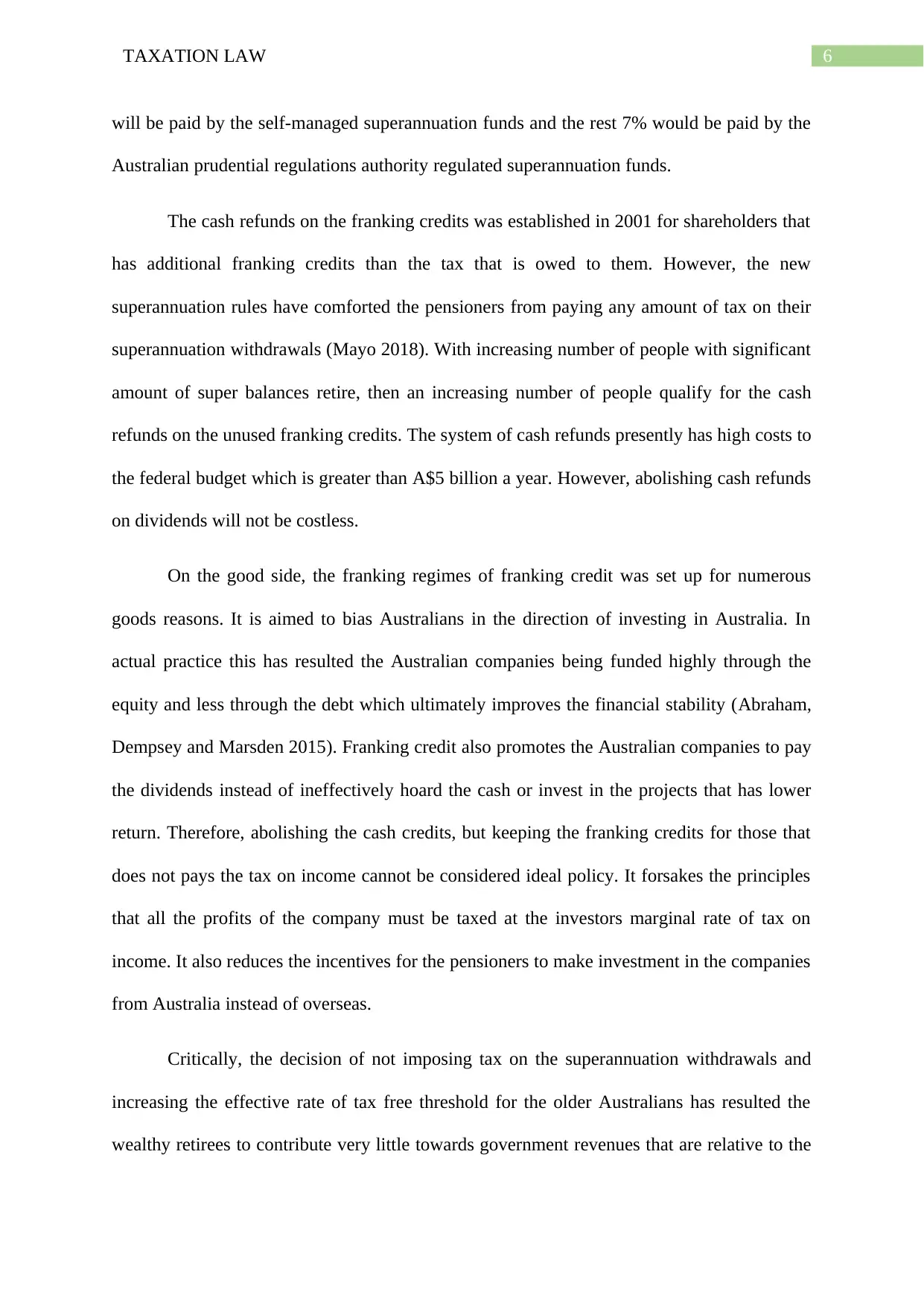
6TAXATION LAW
will be paid by the self-managed superannuation funds and the rest 7% would be paid by the
Australian prudential regulations authority regulated superannuation funds.
The cash refunds on the franking credits was established in 2001 for shareholders that
has additional franking credits than the tax that is owed to them. However, the new
superannuation rules have comforted the pensioners from paying any amount of tax on their
superannuation withdrawals (Mayo 2018). With increasing number of people with significant
amount of super balances retire, then an increasing number of people qualify for the cash
refunds on the unused franking credits. The system of cash refunds presently has high costs to
the federal budget which is greater than A$5 billion a year. However, abolishing cash refunds
on dividends will not be costless.
On the good side, the franking regimes of franking credit was set up for numerous
goods reasons. It is aimed to bias Australians in the direction of investing in Australia. In
actual practice this has resulted the Australian companies being funded highly through the
equity and less through the debt which ultimately improves the financial stability (Abraham,
Dempsey and Marsden 2015). Franking credit also promotes the Australian companies to pay
the dividends instead of ineffectively hoard the cash or invest in the projects that has lower
return. Therefore, abolishing the cash credits, but keeping the franking credits for those that
does not pays the tax on income cannot be considered ideal policy. It forsakes the principles
that all the profits of the company must be taxed at the investors marginal rate of tax on
income. It also reduces the incentives for the pensioners to make investment in the companies
from Australia instead of overseas.
Critically, the decision of not imposing tax on the superannuation withdrawals and
increasing the effective rate of tax free threshold for the older Australians has resulted the
wealthy retirees to contribute very little towards government revenues that are relative to the
will be paid by the self-managed superannuation funds and the rest 7% would be paid by the
Australian prudential regulations authority regulated superannuation funds.
The cash refunds on the franking credits was established in 2001 for shareholders that
has additional franking credits than the tax that is owed to them. However, the new
superannuation rules have comforted the pensioners from paying any amount of tax on their
superannuation withdrawals (Mayo 2018). With increasing number of people with significant
amount of super balances retire, then an increasing number of people qualify for the cash
refunds on the unused franking credits. The system of cash refunds presently has high costs to
the federal budget which is greater than A$5 billion a year. However, abolishing cash refunds
on dividends will not be costless.
On the good side, the franking regimes of franking credit was set up for numerous
goods reasons. It is aimed to bias Australians in the direction of investing in Australia. In
actual practice this has resulted the Australian companies being funded highly through the
equity and less through the debt which ultimately improves the financial stability (Abraham,
Dempsey and Marsden 2015). Franking credit also promotes the Australian companies to pay
the dividends instead of ineffectively hoard the cash or invest in the projects that has lower
return. Therefore, abolishing the cash credits, but keeping the franking credits for those that
does not pays the tax on income cannot be considered ideal policy. It forsakes the principles
that all the profits of the company must be taxed at the investors marginal rate of tax on
income. It also reduces the incentives for the pensioners to make investment in the companies
from Australia instead of overseas.
Critically, the decision of not imposing tax on the superannuation withdrawals and
increasing the effective rate of tax free threshold for the older Australians has resulted the
wealthy retirees to contribute very little towards government revenues that are relative to the
Paraphrase This Document
Need a fresh take? Get an instant paraphrase of this document with our AI Paraphraser
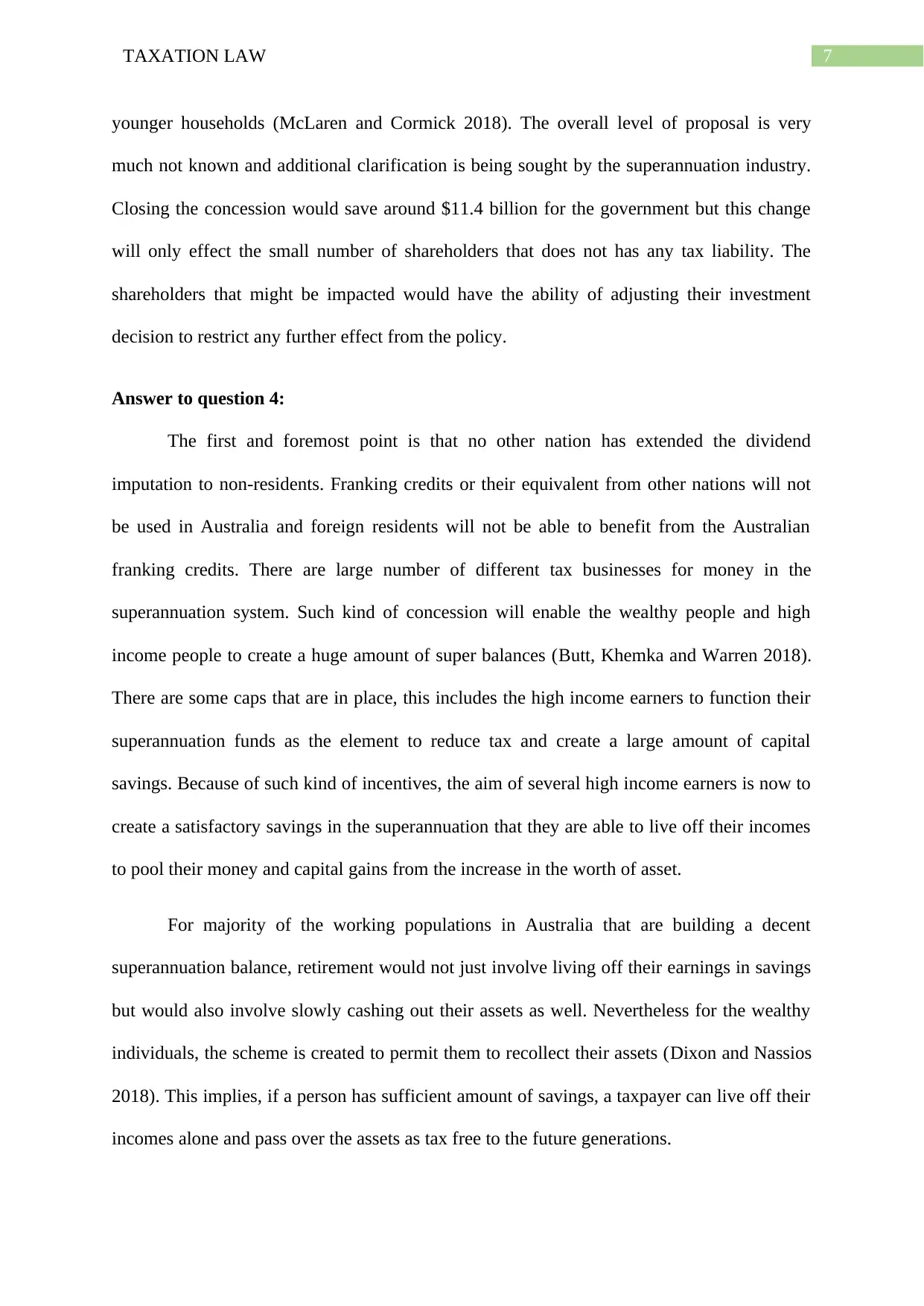
7TAXATION LAW
younger households (McLaren and Cormick 2018). The overall level of proposal is very
much not known and additional clarification is being sought by the superannuation industry.
Closing the concession would save around $11.4 billion for the government but this change
will only effect the small number of shareholders that does not has any tax liability. The
shareholders that might be impacted would have the ability of adjusting their investment
decision to restrict any further effect from the policy.
Answer to question 4:
The first and foremost point is that no other nation has extended the dividend
imputation to non-residents. Franking credits or their equivalent from other nations will not
be used in Australia and foreign residents will not be able to benefit from the Australian
franking credits. There are large number of different tax businesses for money in the
superannuation system. Such kind of concession will enable the wealthy people and high
income people to create a huge amount of super balances (Butt, Khemka and Warren 2018).
There are some caps that are in place, this includes the high income earners to function their
superannuation funds as the element to reduce tax and create a large amount of capital
savings. Because of such kind of incentives, the aim of several high income earners is now to
create a satisfactory savings in the superannuation that they are able to live off their incomes
to pool their money and capital gains from the increase in the worth of asset.
For majority of the working populations in Australia that are building a decent
superannuation balance, retirement would not just involve living off their earnings in savings
but would also involve slowly cashing out their assets as well. Nevertheless for the wealthy
individuals, the scheme is created to permit them to recollect their assets (Dixon and Nassios
2018). This implies, if a person has sufficient amount of savings, a taxpayer can live off their
incomes alone and pass over the assets as tax free to the future generations.
younger households (McLaren and Cormick 2018). The overall level of proposal is very
much not known and additional clarification is being sought by the superannuation industry.
Closing the concession would save around $11.4 billion for the government but this change
will only effect the small number of shareholders that does not has any tax liability. The
shareholders that might be impacted would have the ability of adjusting their investment
decision to restrict any further effect from the policy.
Answer to question 4:
The first and foremost point is that no other nation has extended the dividend
imputation to non-residents. Franking credits or their equivalent from other nations will not
be used in Australia and foreign residents will not be able to benefit from the Australian
franking credits. There are large number of different tax businesses for money in the
superannuation system. Such kind of concession will enable the wealthy people and high
income people to create a huge amount of super balances (Butt, Khemka and Warren 2018).
There are some caps that are in place, this includes the high income earners to function their
superannuation funds as the element to reduce tax and create a large amount of capital
savings. Because of such kind of incentives, the aim of several high income earners is now to
create a satisfactory savings in the superannuation that they are able to live off their incomes
to pool their money and capital gains from the increase in the worth of asset.
For majority of the working populations in Australia that are building a decent
superannuation balance, retirement would not just involve living off their earnings in savings
but would also involve slowly cashing out their assets as well. Nevertheless for the wealthy
individuals, the scheme is created to permit them to recollect their assets (Dixon and Nassios
2018). This implies, if a person has sufficient amount of savings, a taxpayer can live off their
incomes alone and pass over the assets as tax free to the future generations.
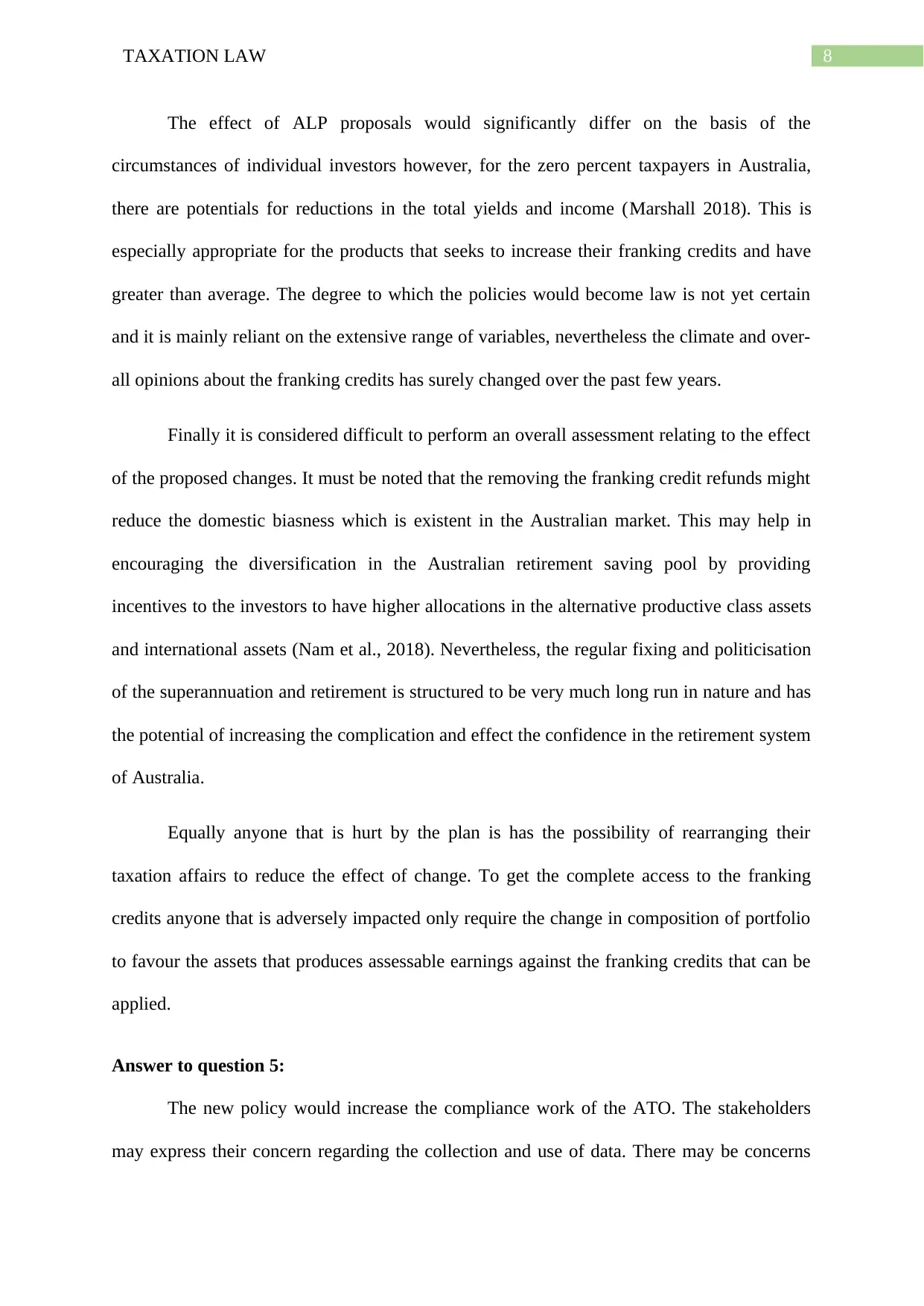
8TAXATION LAW
The effect of ALP proposals would significantly differ on the basis of the
circumstances of individual investors however, for the zero percent taxpayers in Australia,
there are potentials for reductions in the total yields and income (Marshall 2018). This is
especially appropriate for the products that seeks to increase their franking credits and have
greater than average. The degree to which the policies would become law is not yet certain
and it is mainly reliant on the extensive range of variables, nevertheless the climate and over-
all opinions about the franking credits has surely changed over the past few years.
Finally it is considered difficult to perform an overall assessment relating to the effect
of the proposed changes. It must be noted that the removing the franking credit refunds might
reduce the domestic biasness which is existent in the Australian market. This may help in
encouraging the diversification in the Australian retirement saving pool by providing
incentives to the investors to have higher allocations in the alternative productive class assets
and international assets (Nam et al., 2018). Nevertheless, the regular fixing and politicisation
of the superannuation and retirement is structured to be very much long run in nature and has
the potential of increasing the complication and effect the confidence in the retirement system
of Australia.
Equally anyone that is hurt by the plan is has the possibility of rearranging their
taxation affairs to reduce the effect of change. To get the complete access to the franking
credits anyone that is adversely impacted only require the change in composition of portfolio
to favour the assets that produces assessable earnings against the franking credits that can be
applied.
Answer to question 5:
The new policy would increase the compliance work of the ATO. The stakeholders
may express their concern regarding the collection and use of data. There may be concerns
The effect of ALP proposals would significantly differ on the basis of the
circumstances of individual investors however, for the zero percent taxpayers in Australia,
there are potentials for reductions in the total yields and income (Marshall 2018). This is
especially appropriate for the products that seeks to increase their franking credits and have
greater than average. The degree to which the policies would become law is not yet certain
and it is mainly reliant on the extensive range of variables, nevertheless the climate and over-
all opinions about the franking credits has surely changed over the past few years.
Finally it is considered difficult to perform an overall assessment relating to the effect
of the proposed changes. It must be noted that the removing the franking credit refunds might
reduce the domestic biasness which is existent in the Australian market. This may help in
encouraging the diversification in the Australian retirement saving pool by providing
incentives to the investors to have higher allocations in the alternative productive class assets
and international assets (Nam et al., 2018). Nevertheless, the regular fixing and politicisation
of the superannuation and retirement is structured to be very much long run in nature and has
the potential of increasing the complication and effect the confidence in the retirement system
of Australia.
Equally anyone that is hurt by the plan is has the possibility of rearranging their
taxation affairs to reduce the effect of change. To get the complete access to the franking
credits anyone that is adversely impacted only require the change in composition of portfolio
to favour the assets that produces assessable earnings against the franking credits that can be
applied.
Answer to question 5:
The new policy would increase the compliance work of the ATO. The stakeholders
may express their concern regarding the collection and use of data. There may be concerns
⊘ This is a preview!⊘
Do you want full access?
Subscribe today to unlock all pages.

Trusted by 1+ million students worldwide
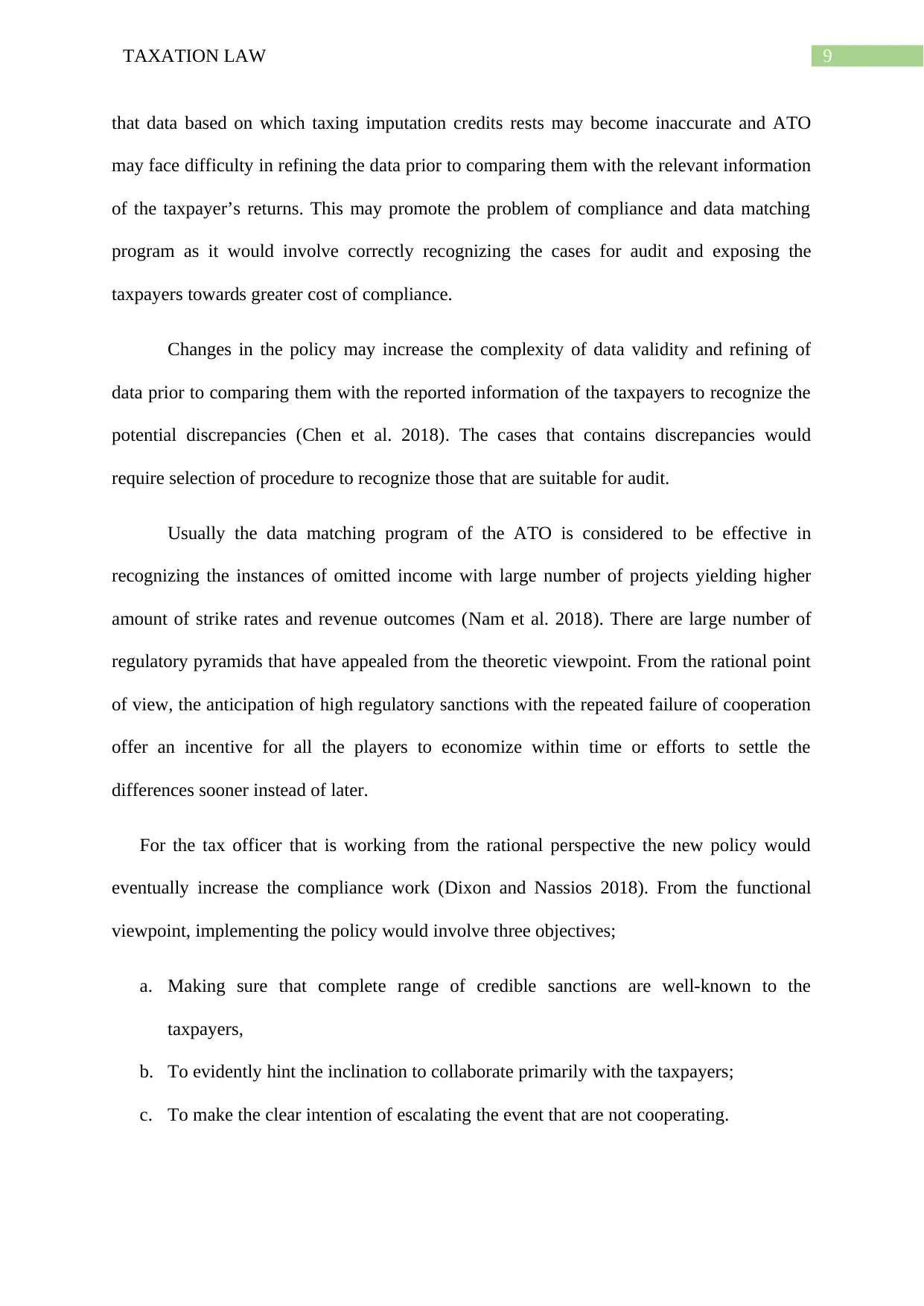
9TAXATION LAW
that data based on which taxing imputation credits rests may become inaccurate and ATO
may face difficulty in refining the data prior to comparing them with the relevant information
of the taxpayer’s returns. This may promote the problem of compliance and data matching
program as it would involve correctly recognizing the cases for audit and exposing the
taxpayers towards greater cost of compliance.
Changes in the policy may increase the complexity of data validity and refining of
data prior to comparing them with the reported information of the taxpayers to recognize the
potential discrepancies (Chen et al. 2018). The cases that contains discrepancies would
require selection of procedure to recognize those that are suitable for audit.
Usually the data matching program of the ATO is considered to be effective in
recognizing the instances of omitted income with large number of projects yielding higher
amount of strike rates and revenue outcomes (Nam et al. 2018). There are large number of
regulatory pyramids that have appealed from the theoretic viewpoint. From the rational point
of view, the anticipation of high regulatory sanctions with the repeated failure of cooperation
offer an incentive for all the players to economize within time or efforts to settle the
differences sooner instead of later.
For the tax officer that is working from the rational perspective the new policy would
eventually increase the compliance work (Dixon and Nassios 2018). From the functional
viewpoint, implementing the policy would involve three objectives;
a. Making sure that complete range of credible sanctions are well-known to the
taxpayers,
b. To evidently hint the inclination to collaborate primarily with the taxpayers;
c. To make the clear intention of escalating the event that are not cooperating.
that data based on which taxing imputation credits rests may become inaccurate and ATO
may face difficulty in refining the data prior to comparing them with the relevant information
of the taxpayer’s returns. This may promote the problem of compliance and data matching
program as it would involve correctly recognizing the cases for audit and exposing the
taxpayers towards greater cost of compliance.
Changes in the policy may increase the complexity of data validity and refining of
data prior to comparing them with the reported information of the taxpayers to recognize the
potential discrepancies (Chen et al. 2018). The cases that contains discrepancies would
require selection of procedure to recognize those that are suitable for audit.
Usually the data matching program of the ATO is considered to be effective in
recognizing the instances of omitted income with large number of projects yielding higher
amount of strike rates and revenue outcomes (Nam et al. 2018). There are large number of
regulatory pyramids that have appealed from the theoretic viewpoint. From the rational point
of view, the anticipation of high regulatory sanctions with the repeated failure of cooperation
offer an incentive for all the players to economize within time or efforts to settle the
differences sooner instead of later.
For the tax officer that is working from the rational perspective the new policy would
eventually increase the compliance work (Dixon and Nassios 2018). From the functional
viewpoint, implementing the policy would involve three objectives;
a. Making sure that complete range of credible sanctions are well-known to the
taxpayers,
b. To evidently hint the inclination to collaborate primarily with the taxpayers;
c. To make the clear intention of escalating the event that are not cooperating.
Paraphrase This Document
Need a fresh take? Get an instant paraphrase of this document with our AI Paraphraser
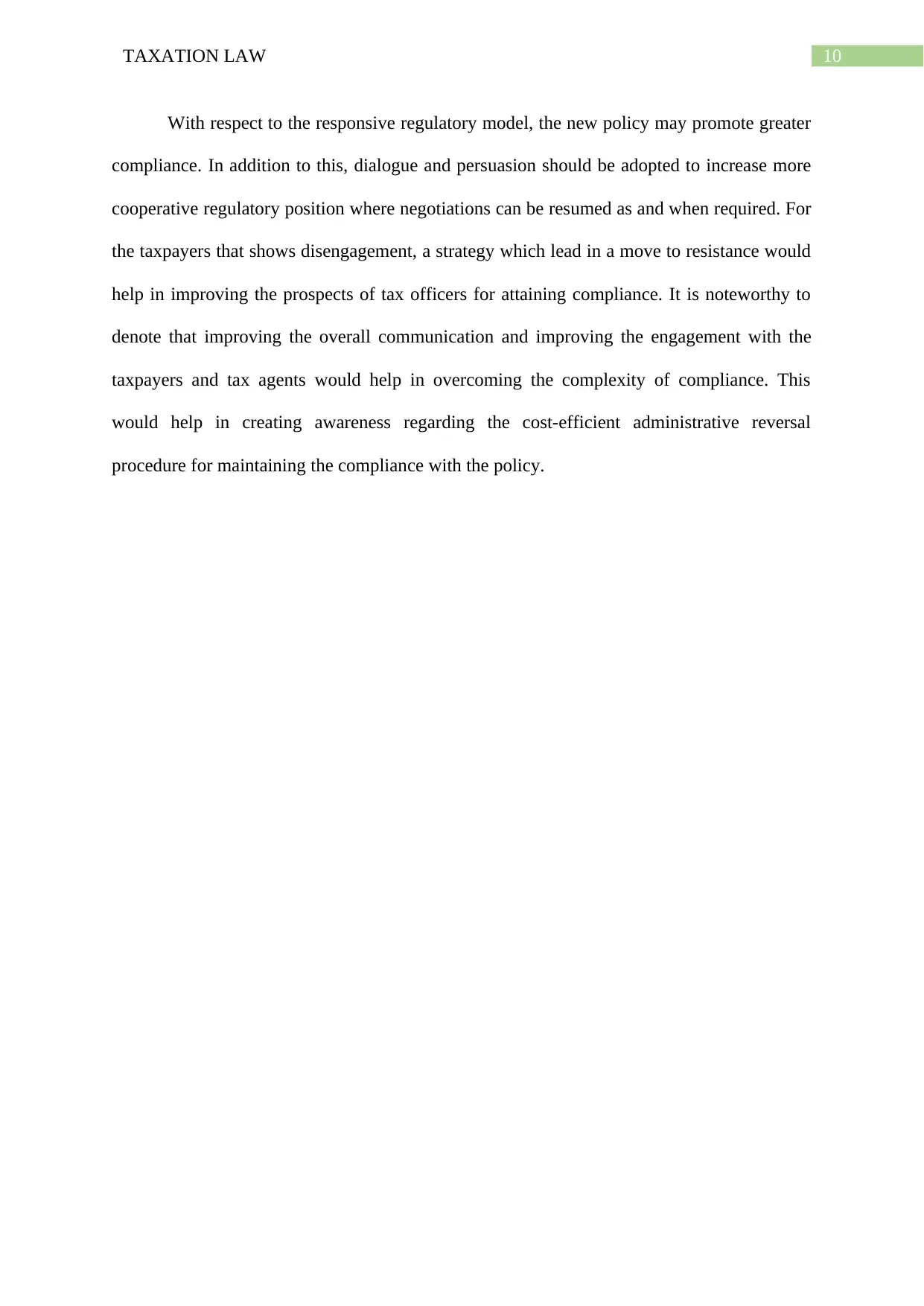
10TAXATION LAW
With respect to the responsive regulatory model, the new policy may promote greater
compliance. In addition to this, dialogue and persuasion should be adopted to increase more
cooperative regulatory position where negotiations can be resumed as and when required. For
the taxpayers that shows disengagement, a strategy which lead in a move to resistance would
help in improving the prospects of tax officers for attaining compliance. It is noteworthy to
denote that improving the overall communication and improving the engagement with the
taxpayers and tax agents would help in overcoming the complexity of compliance. This
would help in creating awareness regarding the cost-efficient administrative reversal
procedure for maintaining the compliance with the policy.
With respect to the responsive regulatory model, the new policy may promote greater
compliance. In addition to this, dialogue and persuasion should be adopted to increase more
cooperative regulatory position where negotiations can be resumed as and when required. For
the taxpayers that shows disengagement, a strategy which lead in a move to resistance would
help in improving the prospects of tax officers for attaining compliance. It is noteworthy to
denote that improving the overall communication and improving the engagement with the
taxpayers and tax agents would help in overcoming the complexity of compliance. This
would help in creating awareness regarding the cost-efficient administrative reversal
procedure for maintaining the compliance with the policy.

11TAXATION LAW
References:
Abraham, M., Dempsey, M. and Marsden, A., 2015. Dividend reinvestment plans: a tax-
based incentive under the Australian imputation tax system. Austl. Tax F., 30, p.435.
Ainsworth, A., Partington, G. and Warren, G.J., 2016. The impact of dividend imputation on
share prices, the cost of capital and corporate behaviour. JASSA, (1), p.41.
Ainsworth, A.B., Partington, G. and Warren, G., 2015. Do franking credits matter? Exploring
the financial implications of dividend imputation. Exploring the Financial Implications of
Dividend Imputation (June 1, 2015). CIFR Paper, (058).
Balachandran, B., Henry, D. and Vidanapathirana, B., 2016. Long-Term Price Reaction to
Dividend Reduction in an Imputation Environment–Evidence from Australia.
Burkhauser, R.V., Hahn, M.H. and Wilkins, R., 2015. Measuring top incomes using tax
record data: A cautionary tale from Australia. The Journal of Economic Inequality, 13(2),
pp.181-205.
Butt, A., Khemka, G. and Warren, G.J., 2018. What Dividend Imputation Means for
Retirement Savers. Economic Record.
Cannavan, D. and Gray, S., 2017. Dividend drop-off estimates of the value of dividend
imputation tax credits. Pacific-Basin Finance Journal, 46, pp.213-226.
Cannavan, D., Gray, S. and Hall, J., 2017, July. The Market Value of Dividend Imputation
Credits Implied by Futures Prices. In 30th Australasian Finance and Banking Conference.
Chen, Z., Gallagher, D.R., Harman, G., Warren, G. and Xi, L., 2018. How Much Does Tax
Erode Fund Excess Return?. Available at SSRN 2736062.
References:
Abraham, M., Dempsey, M. and Marsden, A., 2015. Dividend reinvestment plans: a tax-
based incentive under the Australian imputation tax system. Austl. Tax F., 30, p.435.
Ainsworth, A., Partington, G. and Warren, G.J., 2016. The impact of dividend imputation on
share prices, the cost of capital and corporate behaviour. JASSA, (1), p.41.
Ainsworth, A.B., Partington, G. and Warren, G., 2015. Do franking credits matter? Exploring
the financial implications of dividend imputation. Exploring the Financial Implications of
Dividend Imputation (June 1, 2015). CIFR Paper, (058).
Balachandran, B., Henry, D. and Vidanapathirana, B., 2016. Long-Term Price Reaction to
Dividend Reduction in an Imputation Environment–Evidence from Australia.
Burkhauser, R.V., Hahn, M.H. and Wilkins, R., 2015. Measuring top incomes using tax
record data: A cautionary tale from Australia. The Journal of Economic Inequality, 13(2),
pp.181-205.
Butt, A., Khemka, G. and Warren, G.J., 2018. What Dividend Imputation Means for
Retirement Savers. Economic Record.
Cannavan, D. and Gray, S., 2017. Dividend drop-off estimates of the value of dividend
imputation tax credits. Pacific-Basin Finance Journal, 46, pp.213-226.
Cannavan, D., Gray, S. and Hall, J., 2017, July. The Market Value of Dividend Imputation
Credits Implied by Futures Prices. In 30th Australasian Finance and Banking Conference.
Chen, Z., Gallagher, D.R., Harman, G., Warren, G. and Xi, L., 2018. How Much Does Tax
Erode Fund Excess Return?. Available at SSRN 2736062.
⊘ This is a preview!⊘
Do you want full access?
Subscribe today to unlock all pages.

Trusted by 1+ million students worldwide
1 out of 14
Related Documents
Your All-in-One AI-Powered Toolkit for Academic Success.
+13062052269
info@desklib.com
Available 24*7 on WhatsApp / Email
![[object Object]](/_next/static/media/star-bottom.7253800d.svg)
Unlock your academic potential
Copyright © 2020–2026 A2Z Services. All Rights Reserved. Developed and managed by ZUCOL.





